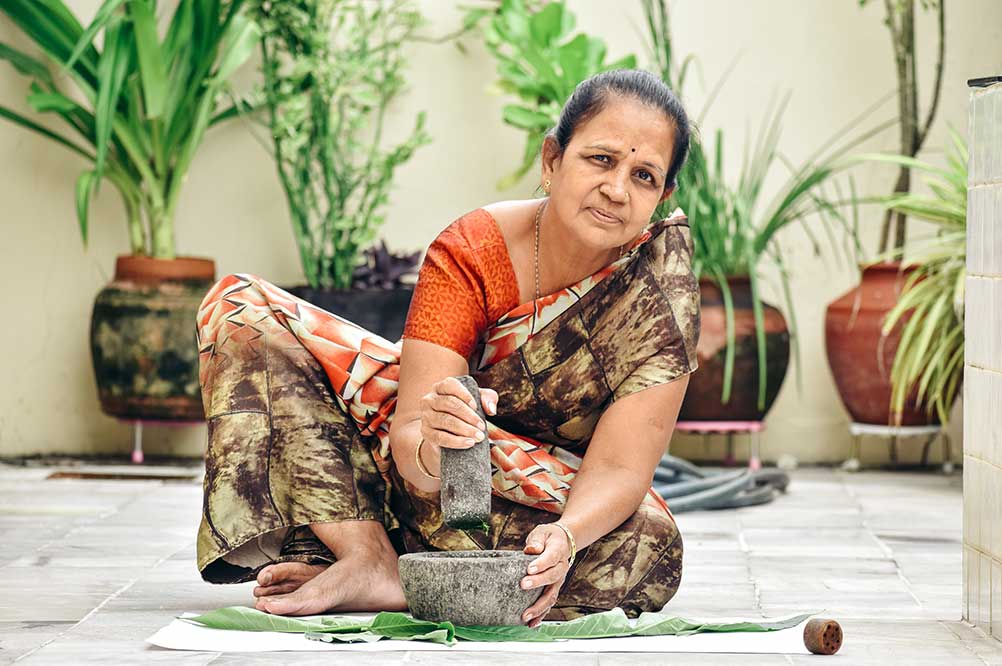If you need a quick refresher course on what the daily life of a homemaker looks like, you need not look beyond the first few minutes of English Vinglish. It’s not just that she does all the work at home that you need done but maybe don’t even notice gets done. She also does it non-stop, every day, for her entire life—and that too, without any pay. If you were doing the same amount of work she does at home at your workplace, you’d be expecting a big raise every quarter!
And yet, the work a homemaker does—also referred to as women’s unpaid labour—is barely ever acknowledged for the huge, nation-building and upstanding work it really is. UN Women estimates that women’s unpaid care and domestic work can be valued at 10 and 39 per cent of the gross domestic product (GDP) of most nations. This makes these nations function at a loss, because if women are engaged in unpaid household and care work, then they have less time to engage in paid labour work—or work out an option where they can have a combination of paid and unpaid work.
So, women’s unpaid labour not only subsidises the cost of care that sustains families, but also supports economies, especially ones where the social services aren’t that active. In fact, with rapid urbanisation and more opportunities of work in cities, men from rural areas are moving to the urban ones. This is expanding the scope of women’s unpaid work by making them the primary labour engaged in farming, especially in countries like India. These are women who are feeding nations like India, for little or no returns.
So, from putting food on the plate to taking care of all your needs, Indian women’s unpaid labour is the foundation on which our lives are built. She has your back from the moment you are born to the time when you die—and all the time in between. But do we have hers?

The Scale Of A Homemaker’s Work
The easiest answer is, no we don’t, but we are getting there. The moment we acknowledge the fact that women’s domestic work as well as child and elderly care work is basically unpaid, we are at least taking a step towards recognising the problem at the centre of the situation. In fact, experts, policymakers and activists all over the world are now prompting governments to estimate the scale at which this unpaid work is done and how much it costs. There are now, therefore, many studies that can give you a fair idea about the scale of women’s unpaid care and domestic work.
A 2021 study by McKinsey reveals that women do 75 per cent of all the unpaid care work in the world, spending more than one trillion hours a year on unpaid work which includes childcare, elderly care, cooking and cleaning. The value of this work, according to McKinsey, comes to around $10 trillion per year. This study also points out that the COVID-19 pandemic has stacked the cards further against women, exacerbating their scale of unpaid work. It further suggests that if governments provide subsidised parental and childcare leaves, and if companies offer more flexible work options, women can be more easily transitioned from unpaid domestic work to paid formal work—which can benefit family finances just as much as national ones.
While this transition from household work to formal work can indeed benefit economies, some experts have pointed out that it still doesn’t address the elephant in the room: Who will do the household work, which we all understand is critical for the smooth running of our everyday lives? Wouldn’t it be much easier to instead give the household work done by homemakers and women a more formal recognition? Research on the conditions of homemakers in India certainly indicates that this might be a better solution.

Why Making A Homemaker’s Work Visible Matters
A 2019 study by the National Sample Survey Office (NSSO) revealed critical data in this regard. It showed that Indian women spend 352 minutes (more than 5.8 hours) a day on average to domestic work whether they are homemakers or not, while men put in only 51.8 minutes a day. Further, 49 per cent of Indian women exclusively do unpaid domestic work, which is not registered in any census as work. In the 2011 Census of India, an estimated 159.9 million women said that their primary occupation was “household work”—and yet they were registered as “non-workers” because domestic care work by women isn’t recognised like formal work is!
This means that the work done by 159.9 million women in India is not recognised or quantified into our GDP, which in turn suggests that this simple miscalculation and oversight is making our nation run at a huge loss!
According to a 2018 study by the International Monetary Fund (IMF), if Indian women’s participation in the economy through this “household work” which still remains unpaid is factored in, our GDP can grow by a whopping 27 per cent. The report further added that making women’s unpaid work as homemakers more visible will project India’s growth rate at 7.4 per cent against China’s 6.8 per cent, making India the fastest-growing economy. Here are some more benefits of making homemakers’ work more visible:
• Giving household work the same recognition as formal work can give women the confidence that their primary occupation in life is genuine work, and makes a difference to the entire nation.
• Giving homemakers’ work recognition gives them an immense claim to equality in households, especially in patriarchal ones. It can also give them a greater say, more authority in how households are run.
• Formal recognition of household work as real work will steer India towards a more holistic approach towards labour, in the sense that it won’t be limited to just the exchange value of service but will also include more intimate forms of labour that help society progress.
• This formal recognition of homemakers’ work will provide women of the nation with one formal industry which is dominated almost entirely by us. Once this industry’s contribution to the GDP is formalised, it will also help break barriers stacked against women in other fields where their roles are still limited.

Measuring Homemakers’ Valuable Work
But while the promise of formal recognition for a homemaker’s work sounds quite rosy, there are many obstacles that need to be understood first. A key problem is that we don’t have a time-budget calculation for the household work done by homemakers and women, precisely because it is intimate in nature. In India, these household jobs are often explained away as acts of love and duty performed by the mother, the daughter, the wife or the daughter-in-law. This means no woman ever calculates how much time it takes her to accomplish one, let alone all such tasks. Without these specifics of time, the effort taken and the monetary value of the said task, measuring the work done by homemakers is next to impossible.
This is precisely the reason why the idea of a “notional income” for Indian homemakers is stuck at this point in time. In 2021, a three-judge bench of the Supreme Court, while deciding on a car accident case, stated that the work done by homemakers is of extreme value for the economic condition of the family and nation even if this value has not been used in economic analyses like the GDP. Following this, many politicians also took up the cause of promising salaries or “notional incomes” to homemakers—which have not yet materialised, and cannot unless we know how to measure this work properly. Some experts, like Kolkata-based human rights lawyer Prerna Dhoop and research consultant Vandana Dhoop did in an article in The Quint, recommend that there should be a Universal Basic Income (UBI) that the government should pay to homemakers to formalise their recognition as workers in censuses and surveys. This UBI could be in the form of a grant, but it can have the same positive effect on women’s confidence and self-esteem as a proper quantification of their labour.
However, this is all theoretical right now. Ultimately, the reality is that homemakers today still lack the recognition they deserve from their families and society, let alone formal recognition in the economy. But acknowledging the fact that these homemakers—and every woman who spends hours doing household work despite having a full-time or part-time job—are doing real, genuine labour to help you and the nation progress is vital, and a good place to start. So, acknowledge her role, treat her with the same respect you do for anybody who works hard, and most importantly, see if the work she does can be distributed more equally and ably instead of burdening her. Let the homemakers in your life know that while their labour is still not formally recognised, you have her back just like she does yours.